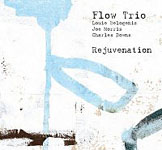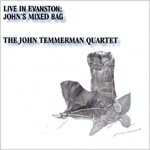Home » Jazz Articles » Interview » Clifton Anderson: Legacy
Clifton Anderson: Legacy
CA: Yes, that was part of my purpose as an artist. I am not a cover artist per se. I don't want to build a career by playing other people's material. The whole point of me doing what I do is because I want to be able to bring something of value to the table.
That speaks back to the time when I was coming up. This was one of the important values in a jazz musician: you want to develop your own sound; you want to develop your own commodities so that you can add to this huge reservoir of music/material that your predecessors have left, and try to meet that standard. That's the place that I have always tried to come from.
I wanted to write some material that I felt had my stamp as a writer on it. Even though I am coming out of J.J. Johnson, Slide Hampton was a mentor, Curtis Fuller; I love listening to them all along with many other trombone players. I don't want to sound exactly like any one of them. What I am trying to do is take their standards and mold them into my own thing: the quality of the sound, the articulation and the harmonic concepts. Slide Hampton takes so many guys under his wing that you hear a lot of the guys coming out now—harmonically they play exactly like him. It is a nice thing but it is not a development of an original path.
Writing
AAJ: When you are writing a piece, do you do any kind of rough sketch of what will occur within your solos?CA: In my mind I do, but I don't put it down. I know what I want to evoke from a particular song. Usually when songs come to me, they just pop into my head. Sometimes it is a rhythm and sometimes a melody, more often it is a melody. So when I write the basic material and then I start to polish it up, I am looking for refinements: does it need a bridge, an intro or a coda? Sometimes it just is what it is.
AAJ: Do you have a preferred size of ensemble to write for?
CA: I am trying to concentrate right now more on quartet and quintet settings. That will change as well. This is basically because this is what I am studying now as a band member of Sonny's group. There is a study that is always going on, even though were playing, et cetera. It is really a study that is coming from him of how he approaches the smaller group. Of course, you know he has been in some of the most heralded quintets, so I like to try and get an understanding of music in this setting from Sonny.
I just try to see where he is coming from and how he approaches the music that way. It gives me some insight as to what can happen. It is also fairly expansive; there are a lot of ways and methods of dealing with a quintet or quartet situation. You have more flexibility when you are performing live than on a record. A record has to fulfill a lot of requirements; I guess I have come to agree with Sonny that recording is more restrictive. It is not as easy to develop things by writing for recording, as having material that you can work through with your group.
If you are fortunate enough to have a regular working band, then you can bring that into the recording studio and do it that way. But when you are doing a project like Landmarks, that the chemistry was so good in the studio for it that we were able to do seven or eight tracks, we just moved right along, but it was a concerted effort to write the material for that recording.
It was very similar with Decade (Doxy, 2008), because I have been with Sonny and didn't have a working band per se. I go to Japan under my own name but it is not my working band, I use a pick up band. I have done some other things where I have put together a group but not a steady working band. It is harder to write for those situations.
AAJ: What things, musical or otherwise, affect and inspire how you play and write?
CA: People, events and life in general. I tend to write a lot of songs that are inspired by relationships with people—knowing somebody and hearing some music that is associated with that person. Sometimes I write about dealing with things of spiritual nature and senses. I try to go out and absorb, like a big sponge, as much as I can in every situation that I am in. I don't' try to do anything with it, I just let it in. I know that things will come through me at a certain time when it is ready. I just try to let that process go naturally.
Decade
AAJ: What were the differences producing and playing on your latest album, Decade, versus your first, Landmark?CA: Production-wise, it was easier to do because I had developed more as a producer and was more comfortable with directing the musicians in the studio and was a little clearer as to what needed to be done technically, from a producers standpoint. I also had an excellent engineer Richard Corsello with me. He was able to give me what I was looking for as well as add some insights, which is very important for the producer to have a good engineer working with him all the time. That is one of the essentials because the engineer can provide you with ideas of how to get what you want, or if you don't have enough of those ideas on your own, they can provide you something extra.
Unlike with Landmarks, which was originally supposed to be a demo and was rushed, I had material that I was really ready to record. I was waiting for the right opportunity with Decade to come for a couple of years. When we went into the studio with Decade I was more confident as a player than I was with Landmarks. I have a different sense of confidence on my instrument and what I want to say musically. As a player, it was easier because I am clearer on who I am now than I was then.
I also have a lot more history with most of the musicians that are on here. I had a history with Al Foster and Bob Cranshaw when I made Landmarks, and the two of them are back for this record. I am very comfortable with all of the guys who are on the record—personally very comfortable with all of them. This makes for a much better scene when you are making music. A lot of groups look good on paper, but it doesn't always work out musically when you get together. So that chemistry is very important.
Usually people who have known each other for a long time have an ability to understand each other, know where we are coming from. Even musicians who aren't coming from exactly the same place but know each other well will know what the other person wants and knows how to get to it. So this was the kind of situation with Decade.
Everybody on there I have a good rapport with. I have known Christian McBride [bass] for several years now; we had never played together but we have always been in the same circles and we have always gotten along well. Stephen Scott used to be with Sonny, so we did many tours together. Stephen's one of my favorite piano players. Larry Willis [piano], I played with on and off throughout the years, not a lot but enough to know that he is somebody I wanted to work with and somebody who could bring the music that I brought to him to life (and put his own thing on it). Al Foster [drums]—of course I have spent a lot of time with Al, one of my favorite drummers. Bob Cranshaw [bass guitar] and Steve Jordan [drums] I mentioned earlier and have known for a long time. Kenny Garrett [alto sax] I met when he first came to New York. And Eric Wyatt, who is Sonny's godson, playing tenor on a couple of tracks—Eric and I have played a couple of things around New York. Everybody on the record I have a good musical relationship/understanding with.
The only question was what the energy was going to be like when everybody got together. So that is what I had to work out—who was going to play on what and what combination of musicians. I knew I had Al, Bob and Larry Willis: the veterans who were going to bring a certain kind of sound/aesthetic to the project. So I thought about my material and what songs/tracks I really wanted to identify them with, and the same thing with the other musicians.
AAJ: Did you have an excess of pieces written and ready for this album?
CA: I have a lot of material. I write a lot and have a lot of music in my head that is waiting to be written down. When I did Landmarks, I had enough material for maybe two or three more records at that point, and that was a little over ten years ago. So for Decade, I had more material.
AAJ: One of the covers is not a standard, but a song by the '70s soft rock group, Bread. How did you choose the song?
CA: There were a couple of things that came up on Decade that were not necessarily going to be recorded at the time. One of them was "If," a song by David Gates. That happened because around the time that we were approaching recording, I just started hearing that melody in my head all the time. I couldn't get it out of my head. It wasn't a piece that I had thought about until maybe a couple of weeks prior to the session.
I happen to like a lot of the melodies that David Gates and Bread did, but this one I hadn't really thought about for years. Then for some strange reason it just started rotating in my head, over and over again. I then thought maybe it would lend itself well to the trombone, so I picked up my horn and started running through. I found a good key, put a little tag section on it and it turned out to really work well. I decided to bring it into the studio because I knew that Christian, Stephen Scott and Steve Jordan could really give me something on it. So that came in at kind of the last minute.
The duet with Stephen Scott and myself on "We'll Be Together Again" was something that I did at kind of the last minute as well. At the time I was doing the record, my mother was not well; she was in the hospital and didn't make it, actually. I had been going for almost a year to look after her, and making sure she was ok. When she went into the hospital for this last time, I had a feeling she wasn't going to make it and it was during the process of the recording. So I wanted to play that one for her.
Doxy
AAJ: You run the Doxy Label started by Sonny. What do your current duties entail?CA: Managing a label has a lot of stuff going on; you have to project your product, what's coming out. I think it is a great thing for most musicians to know more about how the business really operates because things happen and change. Once the music is made, that's the end of music, other things become the priority. You have to think about release dates, timing, product, oversaturation, graphic artwork, costs, and concepts—all kinds of other things. You have to have a great publicist; in our case we have Terri Hinte who is one of the great veteran jazz publicists in the business.
We also have Bret Primack, who runs Sonny's website, but he is also vital to the label because anything that happens on the internet regarding the label, sales or these peripheral business dealings—Bret has a certain level of expertise that he brings to the table.
My job is really to organize all these people in Sonny's process with the label, and the product that comes out of the label.
AAJ: Will new artists be signed to Doxy?
CA: Sonny would like to be involved with other artists, but right now the accounting side of the business is not set up for that. Once you get into having to deal with royalties, residuals, percentages and accounting for a lot of people, the business expands.
Right now we have four products: Sonny, Please (2006), Road Shows, Vol. 1 (2008), the DVD (Sonny Rollins in Vienne, 2008) and Decade. With these four products, there is an immense amount of work involved and this is all in-house, since we are family. What we are looking at is the amount of work that would be involved if we were to sign an outside artist. There are several that Sonny would be interested in, but right now the logistics/mechanics of the company are not in place to handle other signings.
That doesn't mean that in the future that were aren't going to do it, because it is something that Sonny and I both want to do. We are trying to work towards that but in a way that would be straightforward. When that day comes, we will be able to expand the label.
AAJ: It would seem that being a producer/owner of a label would allow for far more freedom, but does it ever become a tradeoff with all the extra work?
CA: Right now I would say that, because there is a lot of work involved, but I don't have to answer to somebody trying to say I have to play with this musician or play this kind of recording. Right now, we have a deal with Universal music. We create our own product, they listen to it. So far they have loved everything but if they didn't, we still own our product. So from an artistic standpoint this gives us a great sense of freedom, which is needed as an artist.
AAJ: Do you have a dream project yet unrealized, and what is it?
CA: I have a lot of projects that I would like to do. I would like to play with strings. I would like to orchestrate something. To be able to put my horn in with the context of strings and make a recording would be it—something unique that would stand on its own.
Tags
Clifton Anderson
Interview
Maxwell Chandler
Terri Hinte
United States
Sonny Rollins
Kenny Washington
Steve Jordan
Noel Pointer
Reggie Workman
Clifford Jordan
Charlie Rouse
Walter Booker
Herbie Hancock
Wayne Shorter
Steve Turre
J.J. Johnson
Carlos Garnett
Robin Eubanks
Bob Cranshaw
Slide Hampton
Curtis Fuller
Al Foster
Christian McBride
Stephen Scott
Larry Willis
Kenny Garrett
PREVIOUS / NEXT
Clifton Anderson Concerts
Support All About Jazz
 All About Jazz has been a pillar of jazz since 1995, championing it as an art form and, more importantly, supporting the musicians who make it. Our enduring commitment has made "AAJ" one of the most culturally important websites of its kind, read by hundreds of thousands of fans, musicians and industry figures every month.
All About Jazz has been a pillar of jazz since 1995, championing it as an art form and, more importantly, supporting the musicians who make it. Our enduring commitment has made "AAJ" one of the most culturally important websites of its kind, read by hundreds of thousands of fans, musicians and industry figures every month.





















